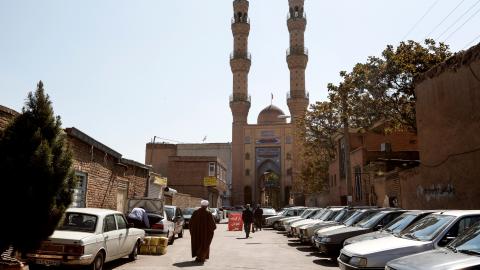Iran and Israel are at war and Israel's extraordinary capacity to target Iran's strategic assets is not news to Iran watchers. Iran has severely suffered from this shadow war.
Take the following examples: In the 2000s Iran's nuclear program was – according to foreign reports – severely compromised and delayed by Stuxnet, as the world's first digital weapon. In 2018, in a daring and surreal move reminiscent of the James Bond movies, Mossad agents snuck tons of nuclear files out of Iran. In August 2020, Israel was accused of having its operatives kill Al-Qaida's number two leader in the heart of Tehran. In November 2020, there was the assassination of the chief of Iran's nuclear program in the Tehran suburbs, reportedly using an AI-assisted weapon. In July 2022, it was reported by foreign outlets that Mossad interrogated an Iranian IRGC member inside Iran.
And recently, on January 29, Israeli drones reportedly targeted Iran's military facilities in Isfahan, a sensitive province in the heart of Iran, home to the country's defense, missile, and nuclear industry.
Mossad operations along the Iranian border, reality, or fiction?
The Aras River serves as a border that has divided the Azerbaijani nation into two for the last two centuries: the Iranian Azerbaijan in the south and the independent Republic of Azerbaijan in the north. Since Azerbaijan's independence in 1991, the northern side of the border has created new opportunities for the Jewish state. Azerbaijani President Ilham Aliyev once acknowledged that nine-tenths of Israel-Azerbaijan cooperation is below the surface. And with Prime Minister Benjamin Netanyahu in office, this strategic security partnership is expected to grow further.
After Azerbaijan liberated its territories from Armenian occupation in 2020, a new geopolitical landscape emerged. Azerbaijan now had a 428-mile shared border with Iran, an entirely unwelcome development for the regime in Tehran.
Iran has frequently warned about Israel's military and intelligence presence in the Iran-Azerbaijan border areas. Yet, Azerbaijan has denied allowing Israel or other countries to use its airspace to carry out attacks on Iran's nuclear and military sites. The Iranian foreign minister last year accused Israel of establishing a military presence and secret alliance with Azerbaijan. The Islamic Republic also believes that Israel's theft of piles of Iran's secret nuclear files in 2018 involved the use of Azerbaijan as a staging ground for that daring operation. More recently, some Iranian media claimed that Israeli drones flew, on January 29, from their bases in Azerbaijan to carry out attacks in Esfahan.
Parties may acknowledge or deny operations along the Iranian border but what is certain is that before, Iran was at war with Israel in the Levant by supporting Arab terrorist groups. Now, Iran feels that this shadow war has expanded to the Aras River.
Iranian Azerbaijanis, its Achilles' heel
While Iran's drones and missiles wreak havoc in the region and few neighboring countries are immune from Iran's direct or proxy attacks, the clerical regime has so far avoided such direct military conflicts with Azerbaijan. Tehran fears that any military confrontation with Baku would provoke Iranian Azerbaijanis plus Turkey.
Tehran considers awakening Azerbaijani nationalism an existential threat to its territorial integrity. Iran is concerned about a powerful Azerbaijan and its spillover effects on Iranian Azerbaijanis, or South Azerbaijanis, as they prefer to call themselves. This explains why Iran wants to have a smaller border with Azerbaijan by supporting Armenian military presence in Azerbaijani territories, as Iran scholar Brenda Shaffer observed.
But the war in 2020 ended up having a totally opposite result, making Azerbaijan more powerful that now shares a longer border with Iran and the clerical regime now must worry about a stronger Israeli presence along its border with Azerbaijan, as well.
To make things worse, Iranian Azerbaijanis have favorable views of Israel, see the Jewish State as their friend, not enemy, and are willing to work with Israel to make Iran weaker. As second-class citizens whose language is banned in public institutions, Iranian-Azerbaijanis seek autonomy from the Persian tyranny and consider Israel an ally in their struggle against the apartheid regime in Iran. This fear of the country's breakup deters the Iranian regime from attacking its smaller northern neighbor, Azerbaijan. Israel is aware of Iran's weak spot and has sought to utilize that to its advantage.
Can Azerbaijan be part of Netanyahu's crusade to stop nuclear Iran?
Netanyahu's return to power set off alarm bells in Iran. Azerbaijan's geographic proximity to Iran makes it a pivot state for Israeli intelligence-gathering and military operations. With only a 300-mile distance to Tehran, Azerbaijan has the closest international border to the clerical regime's capital and some of its military facilities.
It is unlikely that Azerbaijan would greenlight Israel to use its territory for such strikes, but things are changing rapidly in the region. Geopolitical developments such as Azerbaijan's decisive victory in the 2020 Karabakh War, Turkey's growing influence in the region, the declining presence of sanctions-hit Iran, and Russia's entanglement in Ukraine have all contributed to emboldening Azerbaijan.
As Tehran is getting closer to becoming a nuclear-threshold state, Azerbaijan's geographic location, as well as Iran's sizeable Azerbaijani population, are two important factors making the nation a valuable ally for Israel and the United States in countering Iran.
Azerbaijan might be willing to take the risk and become a launching point for a strike against Iran's military sites, on the condition that it receives reassuring security guarantees from the West, namely the United States.


















